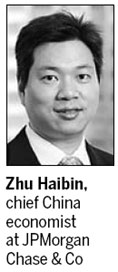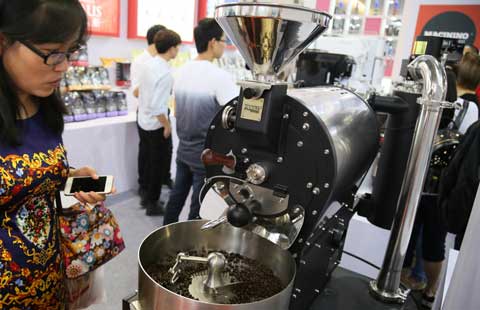China on course for stable growth: JP Morgan
By Chen Jia (China Daily) Updated: 2012-12-07 11:25Expert says expanding investment channels key to freer capital flow
The opening-up of the capital account in China is expected to speed up gradually, as the economy returns to stable growth, a senior Chinese economist said.
Zhu Haibin, chief China economist at JPMorgan Chase & Co, said opening up investment channels to allow freer flow of capital is essential if the yuan is to be used in international finance, a key part of the country's future economic reform.
He added that raising investment quotas under the country's Qualified Foreign Institutional Investors program, the primary channel for foreign capital to access China's capital markets, is likely to be the next impetus to develop the international yuan market, as previous initiatives had failed to halt its appreciation.
"Besides trade settlement, strengthening the investment role of the yuan is crucial for its internationalization."
The State Administration of Foreign Exchange and China Securities Regulatory Commission have taken major steps this year to broaden the financial channels for foreign institutional investors by lifting QFII quotas and those for the renminbi Qualified Foreign Institutional Investor program, which permits qualified investors to channel offshore yuan funds into the mainland's stock and bond markets.
The QFII investment limit increased in April to $80 billion from $30 billion. The RQFII has allowed overseas brokerages, fund houses and trust firms to invest in mainland capital markets since 2002.

To satisfy surging demand from overseas investors, the RQFII quota was raised by 200 billion yuan in November from the previous 70 billion yuan.
"The quota is expected to be continually increased to further encourage both foreign direct investment and outbound direct investment over the next two or three years," said Zhu.
Earlier decisions by SAFE to simplify the QFII and RQFII application processes were also important to facilitate cross-border capital investment, he added.
In November, another seven foreign investors were approved as QFIIs, raising the number of total qualified institutions to 199 as investment amounts reached $33.57 billion.
By the end of November, 64 foreign institutions had invested $11.93 billion under the QFII program.
In recent months, there have been fears that opening up the account could lead to large capital flows in and out of China, which could place great pressure on domestic macroeconomic regulation and financial stability.
But Zhu said, "A further opening of the capital account is unlikely to lead to huge capital inflows, or outflows, and the potential risk may not be as high as many people think." He pointed out that the quota amount should be decided according to market demand.
Zhu added the current gloomy A-share market may influence the investment plans of foreign institutions, encouraging some to shift funds from the stock market to bonds.
But he suggested the current weak investor confidence has mainly come from worries over company profitability, and that sentiment may strengthen as market values recover in line with economic growth.
Zhu said the momentum gained from monetary easing and fiscal stimulus since May was likely to continue into next year, resulting in economic growth of 8 percent.
"China's moderate economic recovery will continue in 2013 with easing measures aimed at supporting infrastructure investment."
Zhu expected investment growth to hit 21.5 percent next year as a result.
While his predictions for global economic growth as a whole were less optimistic, he still sees gradual recovery.
"China's exports are likely to improve to growth of 13 percent in 2013, compared with the forecast increase rate of 8 or 9 percent this year," he said.
Given the turnaround in economic growth in recent months, he does not see any need for more interest rate cuts.
"But there is still room to cut lenders' reserve requirements about two to three times in the first half of 2013," Zhu added.
On the record appreciation of the yuan against the dollar in November, he predicted the Chinese currency "may appreciate to 6.22 by the end of this year", and is "likely to reach 6.15 by the end of 2013".
The appreciation would cause severe damage to the country's export-oriented businesses, however, and companies should remain confident that growth will continue, Zhu said.
"A positive sign is that the central bank has taken fewer measures to influence the foreign exchange rate market in recent months, which will be a significant part of the future reform of the exchange rate system."
chenjia1@chinadaily.com.cn
- Northeast China to reduce power overcapacity, air pollution by 2020
- China's second largest coal firm sees profit rise in H1
- Huawei launches smartphone to tap middle segment
- New-energy vehicle sales to slow
- Quanjude shares surge on speculation
- Airbus set for order boost at airshow
- Entrepreneurs jump into robotics industry
- G20 trade ministers agree to tackle global steel overcapacity


















